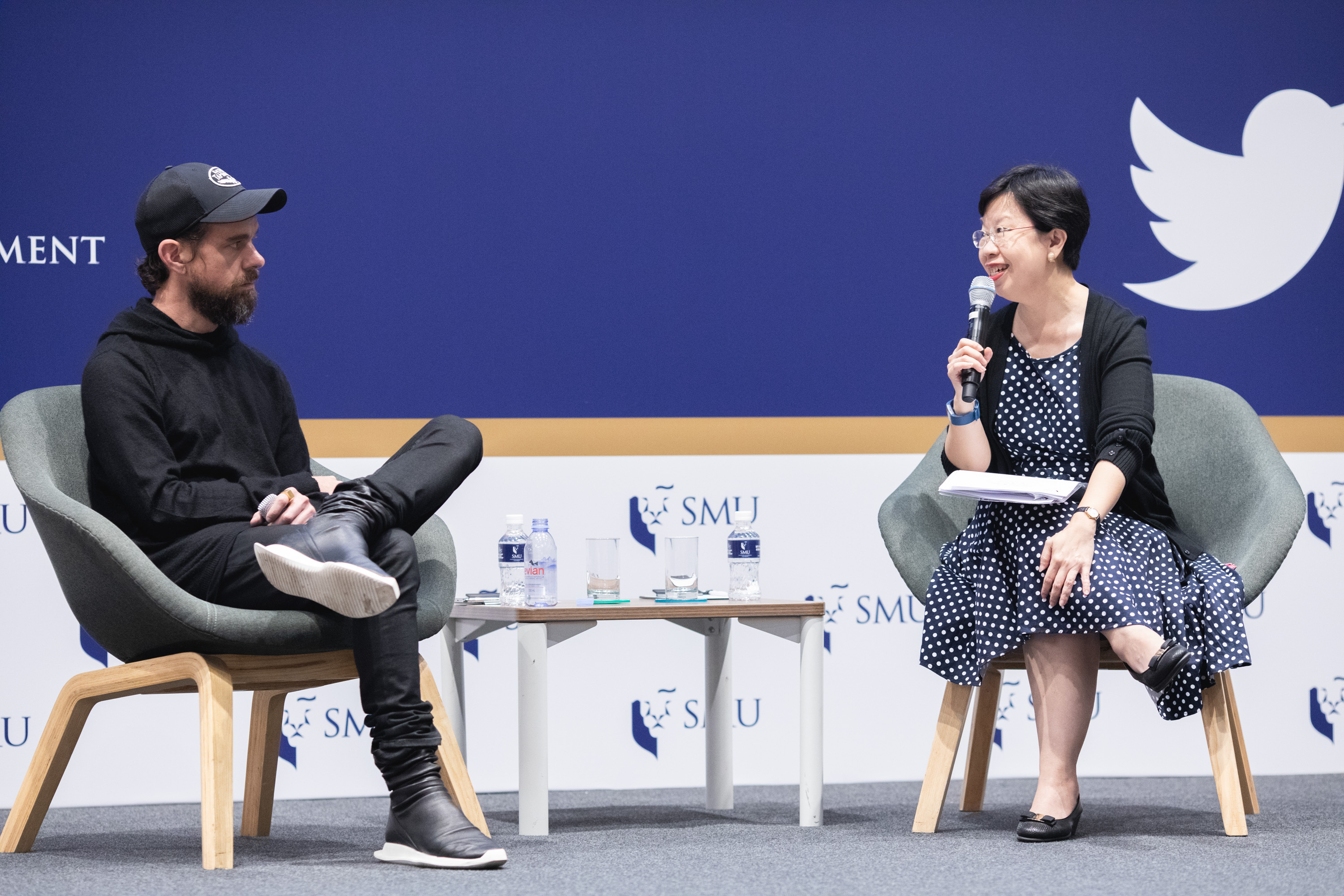
Co-founder and CEO of global social media platform, Twitter, Jack Dorsey reveals what brought Twitter to life, and the lessons the business has taught him in return.
Social media and tech mogul, Jack Dorsey, recently paid a visit to SMU as a guest speaker of a special dialogue that was part of the SMU Presidential Distinguished Lecturer Series (PDLS).
Aside from co-founding the global social networking platform Twitter in 2006, he also co-founded Square Inc. in May 2010 as a platform to facilitate debit and credit card payments. The small, square-shaped device attaches to iPhones, iPads and Android devices and acts as a mini card reader, allowing a person to swipe their card and choose the amount to transfer to the recipient. The company grew steadily over the years and has filed for an IPO back in 2015.
In the recent session of PDLS, Jack opened up about his mission for Twitter, the lessons Twitter has taught him and the source of his drive that fuels his ambitions.
Stopping the echoes

Twitter was initially created from people’s desire to have a conversation. Jack observed that “they didn’t just want to share what was happening, but they wanted to have a conversation about what was happening as well.”
Despite the simple intention behind Twitter, the platform, together with many other social media platforms, has inevitably become an amalgamation of echo chambers that hinder meaningful conversations instead of facilitating it. People inherently are trying to find and follow accounts that match or confirm their views and opinions and the continuous feeding of this dynamic has solidified the echo chamber.
“We are thinking about launching new features to move away from this account bias and more towards topics, like shorter term events that will eventually progress to enduring topics and enduring interests. We think that this is a path to increase the variety of perspectives and hopefully diminish the potential for echo chambers,” Jack said.
One shorter term event that caught Jack’s attention was the New Zealand mosque shooting, where Twitter’s “No Notoriety” policy prohibits the naming of the perpetrator. While agreeing with New Zealand’s Prime Minister Jacinda Arden’s stance of “you will never hear me mention his name”, Jack emphasises that Twitter and social media platforms in general can be used for social betterment.
“The purpose of Twitter is to serve the public conversation and therefore “healthy” needs to be defined. We need to develop metrics and it needs to be open in terms of how we define health, how we measure it, what we are testing for and what we deploy to change trends.”
With that, Jack hopes that as Twitter continues changing its metrics, promoting new topics and conversations, social issues will become a more prominent topic that leads to healthy and open discussions on the platform. While social media might never be rid of echo chambers, steps towards encouraging deeper and more meaningful conversations can help move the platform away from just mindless thoughts and tweets.
Self-awareness and going for more
The point of creating Twitter was to make an impact and to change the way people interact online, and Jack strives to constantly make an impact through his work and improve himself as a leader, a business owner and a fellow colleague.
“Self-awareness is a crucial attribute that everyone should have, and an attribute I always remind myself to have. It allows the identification of one’s strengths and weaknesses to enable the individual to take steps for further self-improvement. It leads me to areas I want to improve. The responsibility I have to the company and to the people is a commitment to constant improvement.”
Aside from the drive to self and professional and social betterment, another secret to Jack’s success is his constant self-questioning of “Why?”s.
“This is the most powerful tool I have,” Jack explained. “The ‘why’ for Twitter when we started was simply: we were selfish and we wanted to use it. That doesn’t sound noble but a lot of these things don’t start that way. They become noble because people use them for noble purposes. As long as we can be open to that reflection back to us, and we can understand the use cases, a new ‘why’ is answered.”
With Twitter’s market cap closing in on $14 billion, Jack hopes that the future for Twitter and social media platforms remain useful medium for users around the world. With technology expanding and advancing on a scale like never before, Jack reminds us that while technology will only continue to scale at exponential rates, “we just need to find the virtue in it and make it better.”

See also: Jack Dorsey@SMU in SMU News and Twitter CEO’s life and business lessons in Perspectives@SMU.


